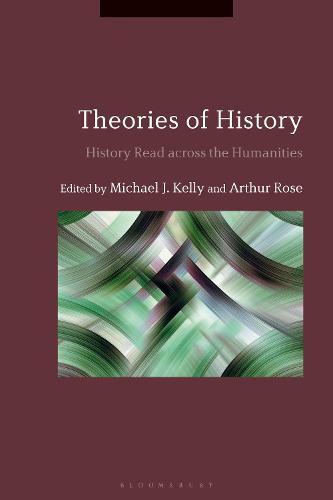Full Product Details
Author: Dr. Michael J. Kelly (State University of New York at Binghamton, USA) ,
Dr Arthur Rose (Postdoctoral Research Fellow, University of Durham, UK)
Publisher: Bloomsbury Publishing PLC
Imprint: Bloomsbury Academic
Weight: 0.544kg
ISBN: 9781474271301
ISBN 10: 1474271308
Pages: 264
Publication Date: 17 May 2018
Audience:
College/higher education
,
Tertiary & Higher Education
Format: Hardback
Publisher's Status: Active
Availability: Manufactured on demand

We will order this item for you from a manufactured on demand supplier.
Reviews
Theories of History: History read across the Humanities is a major achievement in more than one sense. It instigates thinking about history form a refreshingly new perspective, inspired by the work of Alain Badiou, and staring from the following preamble: History is not about finding or creating truths; truths find history. The book raises all the right questions, to which it provides a truly engaging and genuinely collective response. * Alenka Zupancic, Professor of Philosophy and Psychoanalysis, Research Centre of the Slovenian Academy of Sciences and Arts, Slovenia * This intellectually elegant collection of essays explores the complexities of historical theory as it applies to the humanities, broadly conceived. Its learned contributors examine the implications of historical theory to events, musical interpretation, art as a form of visual writing, the contexts and rhetorics of conceptions of time, and the implications of imposing boundaries between the past, present, and future, among other absorbing topics. A collective work of erudition, insight, and scholarly imagination, Theories of History neatly challenges disciplinary boundaries. It will reward attentive readers in every humanistic field. * William G. Rosenberg, Professor of History Emeritus, University of Michigan, USA *
The contributions are invariably thought provoking … [For] those in the field and interested in the theory of history it is a rewarding read and a valuable contribution on multiple levels. * International Network for the Theory of History * Theories of History: History read across the Humanities is a major achievement in more than one sense. It instigates thinking about history form a refreshingly new perspective, inspired by the work of Alain Badiou, and staring from the following preamble: History is not about finding or creating truths; truths find history. The book raises all the right questions, to which it provides a truly engaging and genuinely collective response. * Alenka Zupancic, Professor of Philosophy and Psychoanalysis, Research Centre of the Slovenian Academy of Sciences and Arts, Slovenia * This intellectually elegant collection of essays explores the complexities of historical theory as it applies to the humanities, broadly conceived. Its learned contributors examine the implications of historical theory to events, musical interpretation, art as a form of “visual writing,” the contexts and rhetorics of conceptions of time, and the implications of imposing boundaries between the past, present, and future, among other absorbing topics. A collective work of erudition, insight, and scholarly imagination, Theories of History neatly challenges disciplinary boundaries. It will reward attentive readers in every humanistic field. * William G. Rosenberg, Professor of History Emeritus, University of Michigan, USA * In a series of case studies and theoretical reflections from across the humanities—from archaeology to law to rhetoric—the book gives a vivid snapshot of the most progressive thinking on history today. And if, in its editors’ conviction of the power of Alain Badiou’s ‘evental’ vision of history, we seem to approach a theology (rather than a philosophy) of history, the book is exemplary in its attention to the diverse contexts in which history emerges as a vital profession and invigorating problem. * Alan O'Leary, Professor of Film and Cultural Studies, University of Leeds, UK *
Author Information
Michael J. Kelly is Visiting Assistant Professor in Comparative Literature at the State University of New York at Binghamton, USA. He is the General Director of the project Networks and Neighbours and Co-General Director, with Dolores Castro, of the series Visigothic Symposia. Arthur Rose is a Postdoctoral Research Fellow in English Studies and Medical Humanities at Durham University, UK. He is the author of Literary Cynics: Borges, Beckett, Coetzee (Bloomsbury, 2017).




